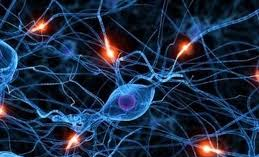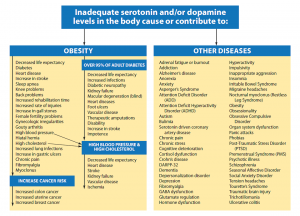
by Dr. Oler, ND | Jan 29, 2015 | Amino Acid Therapy, Naturopathic Health
In a previous post, I summarized the major neurotransmitters along with their functions and diseases associated with dysfunction or imbalance. It is always a risky exercise to put forth such information as it is very easy to draw erroneous conclusions from looking at such data.
For instance, someone looking at this information that has depression may conclude that they have an imbalance with serotonin and simply need to take a serotonin precursor (such as 5-HTP or L-tryptophan) or a substance that modifies serotonin release or absorption (such as St. John’s Wort or an SSRI medication) to alleviate their depression. In practice, this approach seldom works. (more…)

by Dr. Oler, ND | Jan 20, 2015 | Amino Acid Therapy, Depression, Eating Naturally, Naturopathic Health, Stress
There are many natural approaches to try and eliminate depression. Everyone responds to these approaches differently, but there are many common homeopathic and naturopathic solutions that work for a wide number of people.
Form a homeopathic perspective, each person has just one remedy that fits their particular situation at any given time, so it is important that a person wanting to use homeopathic remedies for depression to consult with a homeopath or a naturopath that can help them determine the correct remedy to use. (more…)

by Dr. Oler, ND | Nov 27, 2014 | Natural Remedies, Naturopathic Health, Stress
Are you hosting the holiday festivities this year? These ideas can help you beat the stress and save your energy for the party.
(more…)

by Dr. Oler, ND | Nov 25, 2014 | Naturopathic Health
When most people think of neurotransmitter imbalances, they think of disorders such as depression, anxiety, insomnia and possibly ADD/ADHD and Parkinson’s disease. Usually, that’s because the drugs used to treat these disorders attempt to manipulate various neurotransmitters – including serotonin, dopamine, norepinephrine and GABA – in order to help alleviate symptoms.
However, neurotransmitter imbalances affect almost all of the body’s systems and functions. Therefore, neurotransmitter imbalances can cause a whole host of symptoms and have been implicated in an extremely large and diverse number of disorders, as shown in the table below (click on the table to enlarge):

Table taken with permission from Marty Hinz, MD.
If a person experiences symptoms of any of the disorders listed above, especially if that person is experiencing multiple symptoms or disorders listed in this table, it is highly probable that neurotransmitter imbalance is a root cause that must be properly addressed in order for that person to experience long-term relief of symptoms.

by Dr. Oler, ND | Nov 20, 2014 | Eating Naturally, Migraine, Natural Pain Relief, Natural Remedies, Naturopathic Health
There are many common triggers for migraines, with diet playing a major role for many people that suffer from migraine headaches. Some of the most common foods that can trigger a migraine are:
- Chocolate
- Citrus fruits
- Alcohol (especially red wine or beer)
- Meats preserved with nitrates (ham, bologna, luncheon meats, etc.)
- Pizza
- Aged cheese
- Caffeine (especially while cutting back or eliminating), including coffee, chocolate, soft drinks, over-the-counter and prescription medications that contain caffeine (consult with your physician before changing or discontinuing any medications)
- Nuts
- Fermented, pickled, cured or marinated foods
- Foods prepared with monosodium glutamate (MSG)
- Foods high in tyramine, including aged meats, avocados, bananas, beer, cabbage, canned fish, dairy products, eggplant, hard cheeses, potatoes, raspberries, red plums, tomatoes, wine, and yeast
This is a long (and by no means all-inclusive) list of foods for a person to try and avoid. However, keeping a food journal and completing food hypersensitivity testing can help each person determine their exact triggers to make avoidance more manageable.
In addition to avoiding foods that can trigger a migraine, there are a number of foods that can help improve the production of key neurotransmitters, including serotonin and dopamine. Eating these foods daily can help maintain proper neurotransmitter function.
The pesticides, herbicides and insecticides used on many foods can also disrupt proper neurotransmitter function. Buying these foods organically or substituting them with foods that are lower in chemical exposure can be a great help. To learn more about dietary solutions for migraines, click here.

by Dr. Oler, ND | Nov 18, 2014 | Natural Remedies, Natural Weight Loss, Naturopathic Health
Everybody knows that getting regular exercise is important to improve your health. What most people don’t know is that how you exercise can have a tremendous impact on what that benefit is and how great a benefit you will get. (more…)







